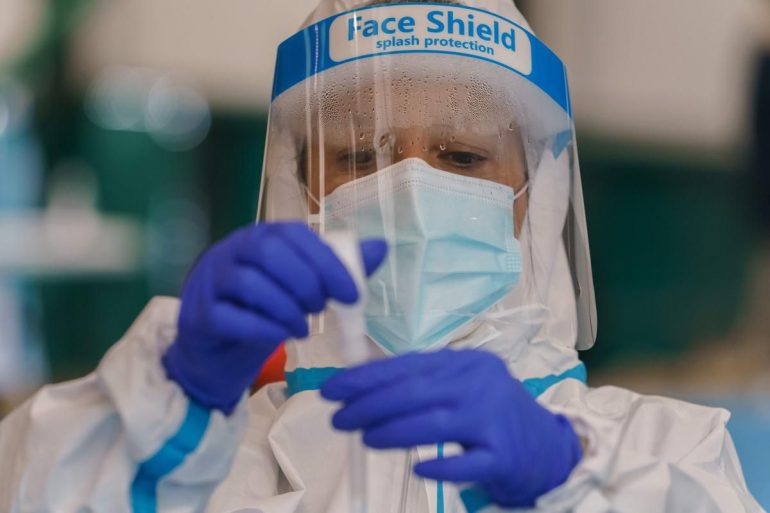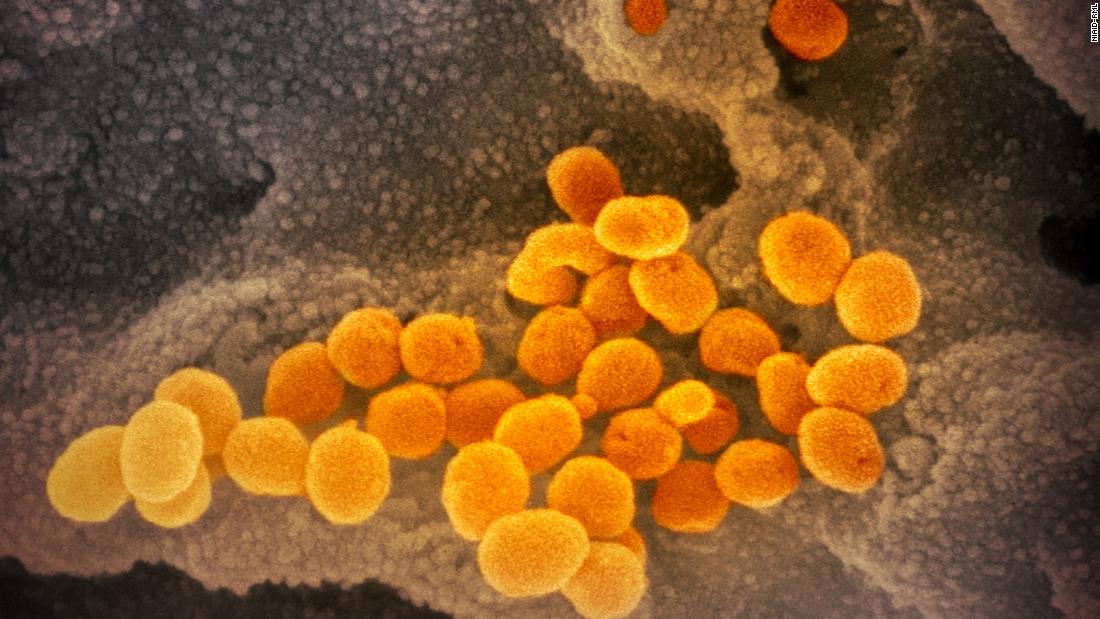The latest coronavirus news from Canada and around the world Saturday. This file will be updated throughout the day. Web links to longer stories if available.
12:04 p.m.: As the coronavirus surges to record levels in Nevada, the governor has implored residents to stay home. But Democrat Steve Sisolak has also encouraged out-of-state visitors, the lifeblood of Nevada’s limping economy, to come to his state and spend money in Las Vegas.
The pandemic has put officials in this tourism-dependent place in a double-bind: trying to protect the economy while keeping people safe.
With the state seeing a record number of new cases, Sisolak said he’s on the brink of imposing new restrictions, but he’s walking a tightrope.
“I don’t want to shut down the entire economy if I can at all avoid it,” Sisolak told reporters on a phone call Wednesday. “We can keep everybody safe and accomplish both ends.”
Nevada’s tourism and hospitality industry has an estimated $67.6 billion economic impact, employing more workers and bringing in more state tax revenue than any other sector. Right now, it’s hurting and Nevada is facing a nearly 13% unemployment rate — the second highest in the U.S. behind Hawaii.
12 p.m.: It has been just over two weeks since Nunavut declared its first case of COVID-19, but it’s still unknown how 84 people were infected so quickly in the territory.
Nunavut is home to about 39,000 people. Its 25 fly-in only communities are spread over three time zones.
Arviat, on the western shore of Hudson Bay where about 2,800 people live, had 58 cases as of Friday. Dr. Michael Patterson, the territory’s chief public health officer, says it’s the only place where there’s evidence of transmission from household to household within the community.
There are also 13 cases in nearby Rankin Inlet, 11 in Whale Cove and two in Sanikiluaq. But those cases are all within the same households.
12:01 p.m.: Despite recent optimism over reported results from COVID-19 vaccine trials, virologists say there is still a long way from lab bench to bedside.
“You would think by this stage of the pandemic we would be leery and skeptical of science by press release,” said Ross Upshur of the University of Toronto’s Dalla Lana School of Public Health.
“The data that has been released was interim data,” said Alyson Kelvin of Dalhousie University. “The trials are still going on.”
Two companies, Pfizer and Moderna, have recently announced they’re developed COVID-19 vaccines that are 95 per cent effective. The news has juiced stock markets, induced politicians to call for expedited use and blown a breath of optimism to a world weary of masks and self-isolation.
11:45 a.m.: The latest numbers of confirmed COVID-19 cases in Canada as of 11:42 a.m. EST on Nov. 21, 2020:
There are 323,496 confirmed cases in Canada.
_ Quebec: 130,888 confirmed (including 6,806 deaths, 112,734 resolved)
_ Ontario: 102,378 confirmed (including 3,472 deaths, 86,079 resolved)
_ Alberta: 43,952 confirmed (including 462 deaths, 32,835 resolved)
_ British Columbia: 25,474 confirmed (including 331 deaths, 17,477 resolved)
_ Manitoba: 12,919 confirmed (including 207 deaths, 4,851 resolved)
_ Saskatchewan: 5,804 confirmed (including 33 deaths, 3,626 resolved)
_ Nova Scotia: 1,160 confirmed (including 65 deaths, 1,067 resolved)
_ New Brunswick: 401 confirmed (including 6 deaths, 343 resolved)
_ Newfoundland and Labrador: 311 confirmed (including 4 deaths, 294 resolved)
_ Nunavut: 84 confirmed
_ Prince Edward Island: 68 confirmed (including 64 resolved)
_ Yukon: 29 confirmed (including 1 death, 22 resolved)
_ Northwest Territories: 15 confirmed (including 10 resolved)
_ Repatriated Canadians: 13 confirmed (including 13 resolved)
_ Total: 323,496 (0 presumptive, 323,496 confirmed including 11,387 deaths, 259,415 resolved)
11:05 a.m.: Quebec is reporting 1,189 new cases of COVID-19 today and 32 additional deaths linked to the novel coronavirus. Public health authorities say five of those deaths occurred within the past 24 hours, with the rest taking place at an earlier date. The Health Department says there are currently 646 people in hospital, an increase of 22 from the previous day.
Of those, 99 people are currently in intensive care, an increase of three from yesterday.
10:57 a.m: The latest numbers of confirmed COVID-19 cases in Canada as of 10:52 a.m. EST on Nov. 21, 2020:
There are 322,307 confirmed cases in Canada.
_ Quebec: 129,699 confirmed (including 6,774 deaths, 111,326 resolved)
_ Ontario: 102,378 confirmed (including 3,472 deaths, 86,079 resolved)
_ Alberta: 43,952 confirmed (including 462 deaths, 32,835 resolved)
_ British Columbia: 25,474 confirmed (including 331 deaths, 17,477 resolved)
_ Manitoba: 12,919 confirmed (including 207 deaths, 4,851 resolved)
_ Saskatchewan: 5,804 confirmed (including 33 deaths, 3,626 resolved)
_ Nova Scotia: 1,160 confirmed (including 65 deaths, 1,067 resolved)
_ New Brunswick: 401 confirmed (including 6 deaths, 343 resolved)
_ Newfoundland and Labrador: 311 confirmed (including 4 deaths, 294 resolved)
_ Nunavut: 84 confirmed
_ Prince Edward Island: 68 confirmed (including 64 resolved)
_ Yukon: 29 confirmed (including 1 death, 22 resolved)
_ Northwest Territories: 15 confirmed (including 10 resolved)
_ Repatriated Canadians: 13 confirmed (including 13 resolved)
_ Total: 322,307 (0 presumptive, 322,307 confirmed including 11,355 deaths, 258,007 resolved)
10:30 a.m.: Ontario’s COVID-19 case numbers hit a new single-day peak today as the province reported 1,588 new instances of the virus in the past 24 hours.
Government figures also show 21 new deaths linked to COVID-19 in that period.
Health Minister Christine Elliott says there are 522 new cases in Peel Region, 450 in Toronto and 153 in York Region, with nearly 46,700 tests completed.
The province is also reporting that 513 people are hospitalized with COVID-19, with 87 on ventilators.
The latest figures bring the total of COVID-19 cases in Ontario to 102,378, with 3,472 deaths, and 86,079 cases resolved.
The new record comes as Toronto and neighbouring Peel Region will move into lockdown on Monday, under the toughest measures available in the province’s COVID-19 restriction system.
10 a.m.: Almost a month has passed since Diane McDonald last saw her mother, who lives next door.
Her sisters and cousin visit but besides them, she says, her door stays locked to keep others away.
Adjusting to the reality of social isolation is hard on people in Fond du Lac Denesuline Nation, one of Saskatchewan’s northernmost communities, located near the Northwest Territories boundary.
Two weeks ago, the fly-in community of about 1,000 people reported its first case of COVID-19.
As of Friday, it had 61 active cases and more than 300 close contacts were in isolation — about 30 per cent of the population.
9:29 a.m.: President Donald Trump said Saturday his eldest son, Donald Trump Jr., is doing “very well” in quarantine after becoming infected with the coronavirus.
“My son Donald is doing very well. Thank you!” the president tweeted, following Friday’s disclosure that the 42-year-old Trump scion had become one of the nearly 12 million Americans infected by the virus.
9:12 a.m.: Saudi Arabia’s King Salman opened on Saturday the Group of 20 summit as the coronavirus pandemic overshadows this year’s gathering of heads of state, transforming it from an in-person two-day meeting of the world’s most powerful leaders to a virtual gathering of speeches and declarations.
The pandemic, which has claimed more than 1.37 million lives worldwide, has offered the G-20 an opportunity to prove how such bodies can facilitate international co-operation in crises — but has also underscored their shortcomings. The G-20’s member-countries represent around 85% of the world’s economic output and three-quarters of international trade.
8 a.m.: Suddenly, things such as travel passes that vouch for your vaccination status, concerts that require a shot to get in the door, or even questions about whether business might refuse to serve the unvaccinated are no longer the purview of speculative fiction writers, but of policymakers, experts and members of the general public.
With doses expected to be scarce, at least at first, we appear set to enter a new era of uneven vaccine access, beginning the day the first doses become available, and ending when they become available to everyone.
That time in the middle? Likely to stretch at least a year in Canada, it will force us to confront questions about who gets a vaccine, when to keep track and how we might take our first tentative steps back to normalcy.
It could also, experts warn, give rise to inequities as the vaccine splinters society into the haves and the have nots.
7:54 a.m.: Households across the U.S. are once again filling grocery carts brimful in a second round of panic buying as the virus surges and states clamp down on economic activity. Defensive purchasing is affecting everything from paper towels to bacon. Even the world’s biggest retailer is reporting shortages of high-demand items, including cleaning supplies, breakfast foods — and the most important commodity in any bathroom.
“It really does have everything to do with what’s happening with Covid cases in any particular community,” Walmart’s chief executive officer, Doug McMillon, said on an earnings call in the past week. “We’re going to be able to respond in this instance better than we did in the first half of the year, although we’re still — as a total supply chain — stressed in some places.”
The new wave of pantry stockpiling hits about eight months after the March boom, meaning makers of packaged food and household items have had some time to prepare. General Mills Inc. added 45 external production lines through contractors this year, while Campbell Soup Co. spent $40 million to expand production of Goldfish crackers, a must for parents cooped up with toddlers. Still, at-home demand is surging, accelerated by a new wave of indoor-dining bans.
7:11 a.m.: Poland will allow shopping malls to reopen, while keeping restaurants, cinemas and schools closed as Prime Minister Mateusz Morawiecki asked for more patience until a virus vaccine arrives.
“We need 100 more days of solidarity,” Morawiecki told reporters on Saturday. “Now we need to ask of ourselves more than ever.”
Poland introduced a near-full lockdown earlier this month after Covid-19 infections surged in October, with daily deaths climbing to a record 637 earlier this week. Schools will remain closed until at least mid-January, while gyms, cinemas, theaters and restaurants won’t reopen before Dec. 27.
7:08 a.m.: Iran on Saturday shuttered businesses and curtailed travel between its major cities, including the capital of Tehran, as it grapples with the worst outbreak of the coronavirus in the Mideast region.
Top Iranian officials initially downplayed the risks posed by the virus outbreak, before recently urging the public to follow measures like wearing masks and avoiding unessential travel.
Iran has recorded daily death tolls of above 430 over the past five days. The Iranian Health Ministry said on Saturday that the total number of confirmed cases has risen to above 840,000.
7:02 a.m.: Madrid’s government will prevent traffic from entering or leaving the region from Dec. 4 to Dec. 14 in its latest step to control Covid-19 infection rates.
The move is aimed at limiting expected increased traffic volumes linked to public holidays on Dec. 7-8, the regional administration said Friday via Twitter.
Loading…
Loading…Loading…Loading…Loading…Loading…
While other Spanish regions have sought to curb infections by imposing stricter measures on movement, Madrid’s regional government is focusing its Covid-19 containment strategy on temporary border closures, a curfew and partial lockdowns in districts with the highest number of cases.
7:01 a.m.: Russia on Saturday reported a new daily high in the number of coronavirus infections and deaths.
The national coronavirus taskforce said 24,822 new cases were recorded over the past day, the fourth time in a week that a new high has been tallied.
It said a record 467 people died of COVID-19.
The surge in infections is straining Russia’s vast but underfunded health care system, with many infected people reportedly forced to search for sparse hospital beds.
Overall, Russia has recorded more than 2,064,000 cases and 35,778 deaths.
7 a.m.: After COVID-19 made it clear the EI system needed to change, the federal government hinted it would work toward bringing the program up to speed. The program is currently being bolstered by temporary changes meant to include more people affected by the pandemic, reducing the number of hours needed to qualify and boosting the wage replacement rate.
In the long run, experts say parental benefits need to be easier to access, offer higher rates, and incentivize both parents to take leave.
7 a.m.: A teenaged girl who set out with her grandmother and mother last spring on a 1,800-kilometre RV trip to seek her new lungs has received the life-changing operation in an era of COVID-related delays.
Tahlia Ali left Halifax on May 20 after receiving word that medical specialists preferred she be near the University Health Network and the Hospital for Sick Children in Toronto as the pandemic continued.
In June, when she last spoke to The Canadian Press, the 16-year-old said she felt ready for the oft-delayed operation, as her energy levels had fallen.
Her grandmother, Judy Robichaud, describes the double lung transplant performed on Monday as “very successful.”
She says the initial surgery to repair two holes in Tahlia’s heart was somewhat more difficult than expected because the heart was more enlarged than anticipated. Robichaud estimates the dual operations required 13 hours.
6:01 a.m.: Prime Minister Justin Trudeau’s effort to try and bring rivals onside to help communicate the dramatic implications of rising COVID-19 infections appears to have faltered.
While Trudeau stood in front of his home Friday and implored Canadians to stay in theirs, opposition leaders didn’t echo that message.
Trudeau had given them a briefing late Thursday on the new modelling data that predicts as many as 20,000 new cases a day by the end of December without urgent action.
6 a.m.: At the northeast corner of Queen Street East and Airport Road in Brampton begins a large stretch of multi-sized warehouses, factories and shops. On any given day, the movement of small and large trucks getting in, loading or unloading, and getting back out is about the only observable activity in the area, save from the occasional construction work. It’s kilometres in either direction before you reach residential parts of the neighbourhood, a mixture of multi-unit housing buildings and stand-alone or semi-detached homes.
This is the part of the GTA that has emerged as the most affected by COVID-19.
Earlier this week, the Star reported that the northeast corner of Brampton has a COVID-19 positivity rate of 19 per cent, that is to say nearly one in five people here tests positive for the virus, based on analysis conducted by non-profit ICES. Peel region as a whole has a positivity rate of 9.8, which is the highest in the GTA.
Click here to read the full story.
6 a.m.: To look at Toronto’s latest job figures, you’d think the city’s economy had largely bounced back.
The numbers, which plummeted in the wake of the COVID-19 pandemic, have largely come back, from an average of 3.04 million jobs in May to an average of 3.4 million jobs for the three months ending in October, according to Statistics Canada data for the census metropolitan area.
And jobs in the information, culture and recreation sector during the same time period are higher even than they were last year — 178,000 compared to 153,500 in 2019.
A deeper look at the numbers that fuel the local economy, though, shows some industries have been devastated, namely the sectors that rely on people congregating.
Click here to read the full story.
5:36 a.m.: Singapore and Hong Kong on Saturday postponed the start of an air travel bubble meant to boost tourism for both cities, amid a spike in coronavirus infections in Hong Kong.
The travel bubble, originally slated to begin Sunday, will be delayed by at least two weeks, Hong Kong’s minister of commerce and economic development, Edward Yau, said at a news conference.
The arrangement is meant to allow travellers between the two cities to travel without having to serve a quarantine as long as they complete coronavirus tests before and after arriving at their destinations, and fly on designated flights.
Hong Kong reported 43 new coronavirus cases on Saturday, including 13 untraceable local infections.
4:06 a.m.: India has reported 46,232 new confirmed coronavirus cases in the past 24 hours, with the situation particularly alarming in New Delhi.
Intensive care wards and the capital’s main crematorium are near capacity, and health officials this week found the prevalence of infections in markets much higher than expected. The city has added an average of 6,700 cases each day in recent weeks.
The next two weeks in the post-festival season, including celebrations for the Diwali holiday, are going to be important in determining which way the virus will go. The Health Ministry on Saturday also registered 564 deaths in the past 24 hours, taking total fatalities up to 132,726.
4:06 a.m.: Japan is scaling back on the government-backed “GoTo” campaign to encourage travel and dining out, as the number of confirmed coronavirus cases reached a record for the third day straight on Saturday, at 2,418.
Prime Minister Yoshihide Suga announced the decision at a government panel on coronavirus pandemic measures.
Stressing the need for “utmost caution,” he said the campaign’s travel discounts will no longer apply to hard-hit areas, and discounts on eating out will end temporarily.
Japan has never had a total lockdown. It has had fewer than 2,000 deaths so far related to the coronavirus. But worries have been growing about a spike in infections over the three-day weekend. Monday is Labor Thanksgiving, a national holiday.
4:02 a.m.: South Korea has reported 386 new cases of the coronavirus in a resurgence that could force authorities to reimpose stronger social distancing restrictions after easing them in October to spur a faltering economy.
The figures released by the Korea Disease Control and Prevention Agency on Saturday raised the country’s total number of confirmed cases to 30,403, including 503 deaths.
More than 270 of the new cases have come from the Seoul metropolitan area, where health workers have struggled to track transmissions in schools, private tutoring academies and religious facilities.
4 a.m.: The latest numbers of confirmed COVID-19 cases in Canada as of 4:00 a.m. EST on Nov. 21, 2020:
There are 320,719 confirmed cases in Canada.
_ Quebec: 129,699 confirmed (including 6,774 deaths, 111,326 resolved)
_ Ontario: 100,790 confirmed (including 3,451 deaths, 84,716 resolved)
_ Alberta: 43,952 confirmed (including 462 deaths, 32,835 resolved)
_ British Columbia: 25,474 confirmed (including 331 deaths, 17,477 resolved)
_ Manitoba: 12,919 confirmed (including 207 deaths, 4,851 resolved)
_ Saskatchewan: 5,804 confirmed (including 33 deaths, 3,626 resolved)
_ Nova Scotia: 1,160 confirmed (including 65 deaths, 1,067 resolved)
_ New Brunswick: 401 confirmed (including 6 deaths, 343 resolved)
_ Newfoundland and Labrador: 311 confirmed (including 4 deaths, 294 resolved)
_ Nunavut: 84 confirmed
_ Prince Edward Island: 68 confirmed (including 64 resolved)
_ Yukon: 29 confirmed (including 1 death, 22 resolved)
_ Northwest Territories: 15 confirmed (including 10 resolved)
_ Repatriated Canadians: 13 confirmed (including 13 resolved)
_ Total: 320,719 (0 presumptive, 320,719 confirmed including 11,334 deaths, 256,644 resolved)
1:48 a.m.: Donald Trump Jr., the president’s son, tested positive for the coronavirus at the beginning of the week and has been isolating since Monday, a spokesman for Trump said Friday.
He added that Trump had shown no symptoms and was following virus protocols.
Trump is the latest person close to the president who has tested positive for COVID-19. Barron Trump, the president’s youngest son, tested positive last month. Melania Trump, the first lady, also tested positive in October. In July, Trump’s girlfriend, Kimberly Guilfoyle, tested positive.
Read about Thursday’s developments here.

Devoted web advocate. Bacon scholar. Internet lover. Passionate twitteraholic. Unable to type with boxing gloves on. Lifelong beer fanatic.





